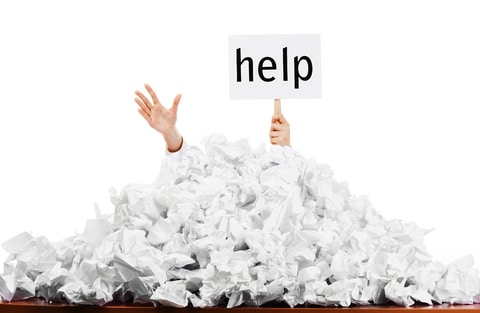
Sort Your Important Documents
It goes without saying that there are some documents you just shouldn’t throw away. Things like birth certificates, marriage and divorce certificates, pension plan documents, passports, wills etc. All of these documents should be kept safe, which means not being shoved in a pile in the office with the old letters and bills. Invest in a small fire proof safe and make sure all of your important documents are stored inside. Your important documents should be anything valuable, irreplaceable or vitally important to you and your family in the event of emergency or death. As you go through your documents you will always know what is important with a capital I and belongs in the safe.
The Filing Drawer
There is usually a spot in every home or office that finds itself home to the ‘sort it later’ pile. This pile tends to be full of bills, official documents, letters and all sorts of other bits and pieces. Going through this pile is usually what stops people from actually sorting their paperwork, but once it’s done you can start working on ensuring it doesn’t come back again. The second stage after sorting your Important documents is to separate everything for the ‘filing’ drawer. This can be an actual filing drawer in your house or a folding box file, as long as it has several separate sections with labels. In this filing drawer you need sections for each type of document – for example, instead of ‘household’, you would have ‘water’, ‘electricity’, ‘gas’, ‘TV’ under which you would file all of your agreements, statements and any extra letters you need to keep. A section for ‘car’ for any vehicle documents or finance agreements is also useful, along with ‘home’ for your house deeds, mortgage statements etc. With this system you can easily file away new paperwork as soon as it arrives, and when you are on the phone to the water board and they ask for your most recent statement it’s really easy to find. It’s also useful having a section in there for payslips, tax information, receipts for valuable items like electronics or jewellery, medical information and insurance documents. All of these are important to keep, but can create one nasty looking pile if they aren’t organised.
The Shredding Pile
Once you’ve sorted out the important documents and the things you need to file, you should have a fairly thin pile. In this pile will be junk mail, monthly statements from phone suppliers, banks and credit cards, maybe some receipts, bank withdrawal or deposit slips and other miscellaneous paperwork. Most of this paperwork is only needed for a short amount of time, so once you’ve reconciled it it’s just taking up space. But that doesn’t mean you should just throw them in the bin. Anything with your (or anyone else’s) name, address, bank details or NI number should be put into a black bag labelled ‘shred’ and either put through your own shredder (which can be very time consuming and not as secure) or handed over to a professional shredding company for secure and thorough destruction. This avoids any attempts at fraud or identity theft that could be made using this information, and it’s one of the easiest steps in the process – just a phone call! There will be a few things, like product manuals for things you don’t own any more or scraps of paper with nothing but ‘call Lucy’ scribbled on them that can go straight on the bin, but just make sure there is nothing on those papers that you wouldn’t want a complete stranger to know.
Once you’ve tackled the pile of paperwork the first time and implemented these systems, you will never again find yourself drowning in paperwork. Anything that needs to be kept can be instantly filed away, and any other documents can be reconciled and then shredded. If you don’t own a shredder or can’t face the chore of getting it all done, we would be happy to help in your de-cluttering effort. Just get in touch today and find out how we can help you get rid of your pile of papers and help it stay down
